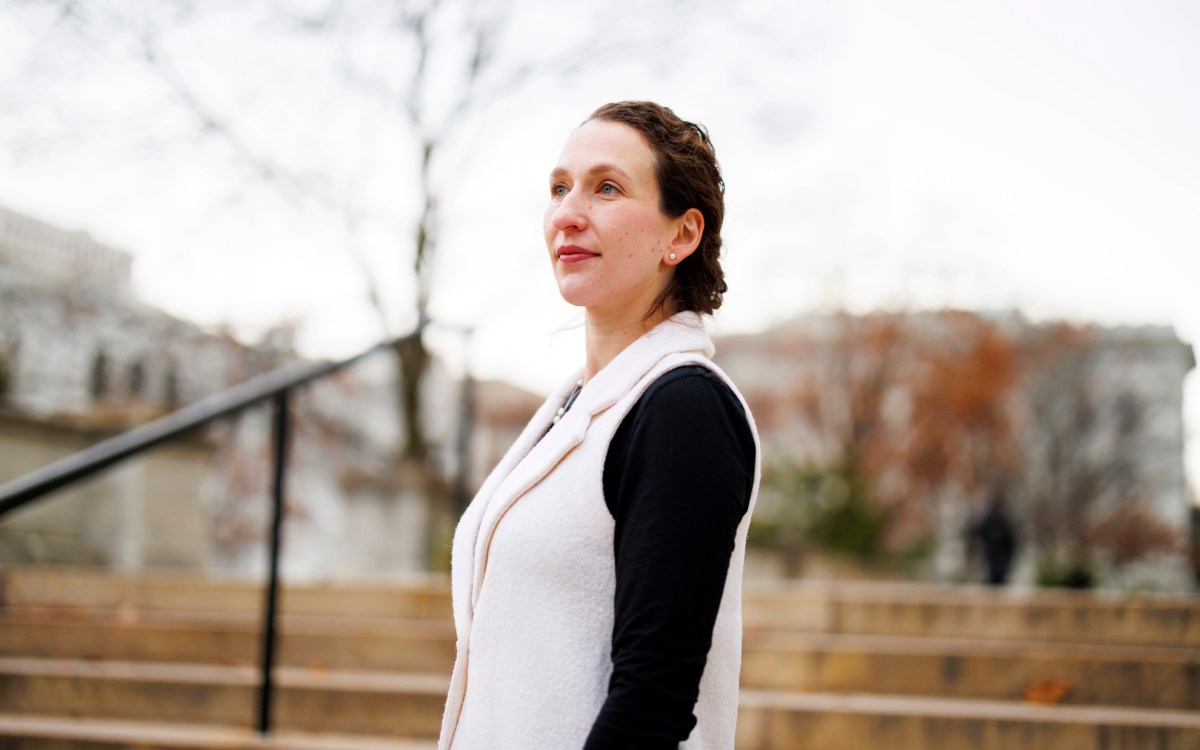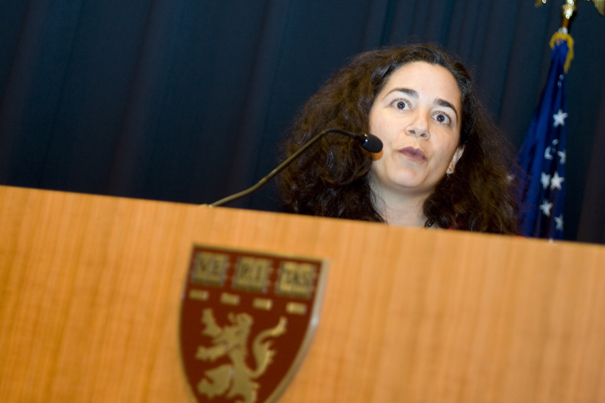Health
-

Break in the case for long COVID investigators
Research highlighting chronic inflammation opens path to treating illness that affects millions of Americans

-

The problem with the school smartphone debate
Study finds most districts already regulate devices. Is the real issue enforcement?

-

Just who gets a say at FDA public drug-approval hearings?
New research shows negative voices are relatively rare in drug approval hearings.
-

Your digital twin might save your life
AI, statistics offer new possibilities for personalized medicine
-

Time to legalize psychedelics?
Campus debate weighs therapeutic need vs. safety questions
-

How a toxin from the gut microbiome may help spark colorectal cancer
Findings suggest colibactin may be promising target for disease prevention

-
Economy shaping health care reform effort
Political and philosophical differences aside, it’s the economic crisis that’s driving the current national health care reform debate. “Every day the president gets an envelope [that] says, ‘Whoa! Bigger [deficit]…
-
Freshwater fish at top of food chain evolve more slowly
Since evolving to eat other fish, freshwater fish at the top of the food chain have remained relatively unchanged compared with their insect- and snail-eating cousins, according to new research.…
-
Scientists create energy-burning brown fat in mice
Harvard researchers at Dana-Farber Cancer Institute have shown that they can engineer mouse and human cells to produce brown fat, a natural energy-burning type of fat that counteracts obesity. If…
-
Maternal, paternal genes’ tug-of-war may last well into childhood
An analysis of rare genetic disorders in which children lack some genes from one parent suggests that maternal and paternal genes engage in a subtle tug-of-war well into childhood, and…
-
MGH researchers develop potentially safer general anesthetic
News release — Mass. General team develops potentially safer general anesthetic A team of Harvard Medical School (HMS) researchers at Massachusetts General Hospital (MGH) has developed a new general anesthetic…
-
Earlier AIDS drug treatment would save 76,000 lives over 5 years
EMBARGO DATE CORRECTION — JULY not August — Study suggests earlier HIV antiviral treatment saves lives and is cost effective, even in areas of limited resources Early initiation of lifesaving…
-
Lifestyle culprit in increase in cardiovascular disease
Despite the perception that cardiovascular disease is a problem of industrialized countries, it is the leading cause of death everywhere except Africa, where it is eclipsed by the raging AIDS…
-
Interfaculty Initiative in Health Policy awards Cordeiro Health Policy Summer Research Grants
Thee Interfaculty Initiative in Health Policy at Harvard has announced the 2009 recipients of the Cordeiro Health Policy Summer Research Grants.
-
An unusual collection: A brain tumor tissue bank
Five years ago, as she was walking into Caritas Holy Family Hospital and Medical Center in Methuen, Mass., Patricia Fay saw a priest she knew and cornered him. “I’m like…
-
Damon Runyon Cancer Research Foundation awards fellowships to Harvard scientists
The Damon Runyon Cancer Research Foundation, a nonprofit organization focused on supporting exceptional early career researchers and innovative cancer research, has selected four Harvard affiliates to receive Damon Runyon fellowships at its May 2009 Fellowship Award Committee review.
-
Steffie Woolhandler, MD, MPH, receives excellence in mentoring award from Harvard Medical School
Steffie Woolhandler, MD, MPH, a staff physician and Associate Professor of Medicine at Harvard Medical School (HMS), is a recipient of the 2008-2009 A. Clifford Barger Excellence in Mentoring Award.…
-
First molecular steps to childhood leukemia identified
A Harvard research based at Massachusetts General Hospital has identified how a chromosomal abnormality known to be associated with acute lymphoblastic leukemia (ALL) – the most common cancer in children…
-
Glimpsing the birth of our earliest reproductive cells
It has long been a mystery how the developing embryo designates those rare, precious cells destined to produce sperm and eggs — enabling us to have offspring – since these…
-
Jeremiah Mead, architect of respiratory mechanics field, dies
Jeremiah “Jere” Mead, architect of the field of respiratory mechanics and professor emeritus in the Department of Environmental Health at the Harvard School of Public Health (HSPH), passed away on…
-
When physicians share notes with their patients
Patients across the country are voicing a growing desire for greater engagement in, and control over, their own medical care. A new study led by Beth Israel Deaconess Medical Center…
-
Human cardiac master stem cells identified
Harvard Stem Cell Institute researchers at Massachusetts General Hospital have identified the earliest master human heart stem cell from human embryonic stem cells – ISL1+ progenitors – that give rise…
-
Spinal fusion protein associated with complications, higher costs
In the United States, back pain continues to be a leading cause of disability and one of the most common reasons to see a physician for evaluation. Among various treatment…
-
Low blood sugar in hospital linked to higher death risk
Harvard researchers at Brigham and Women’s Hospital (BWH) found that diabetics hospitalized for noncritical illnesses who develop hypoglycemia (low blood sugar) during hospitalization have an increased likelihood of remaining hospitalized…
-
AIDS research symposium details advances
Harvard AIDS researchers detailed recent advances in the fight against the ongoing global pandemic, including new vaccine strategies, insights into the disease’s progression in the world’s hardest-hit regions, and new knowledge about the body’s immune response against infection.

-
Safer stem cells for therapy
When stem cell researchers in Japan and the United States announced in 2007 that they had developed long-sought methods to return fully developed adult human cells to an embryonic-like state, the world of stem cell research was turned upside down.
-
Study pinpoints novel cancer gene and biomarker
Dana-Farber Cancer Institute scientists’ discovery of a cancer-causing gene – the first in its family to be linked to cancer – demonstrates how the panoramic view of genomics and the…
-
A urine test for appendicitis?
Harvard researchers at Children’s Hospital Boston have identified a protein in the urine of appendicitis patients that they believe may provide the basis of a quick, noninvasive, accurate, and inexpensive test for the common condition.
-
Common ECG finding may indicate serious cardiac problems
A common electrocardiogram (ECG) finding that has largely been considered insignificant may actually signal an increased risk of atrial fibrillation (a chronic heart rhythm disturbance), the future need for a…
-
D. Mark Hegsted, national force in science of human nutrition, dies
D. Mark Hegsted, who was instrumental in the development of the federal “Dietary Guidelines for Americans,” died Tuesday, June 16, 2009, at the age of 95 at a nursing center…
-
Computer scientists model cell division
Computer scientists at Harvard have developed a framework for studying the arrangement of tissue networks created by cell division across a diverse set of organisms, including fruit flies, tadpoles, and…
-
Individual primates display variation in general intelligence
Scientists at Harvard University have shown, for the first time, that intelligence varies among individual monkeys within a species – in this case, the cotton-top tamarin.

-
Search for new tuberculosis drugs outlined
A new drug candidate that attacks the cell walls of tuberculosis bacteria offers a promising alternative in the fight against a disease that has been resurgent in the global age of AIDS, according to findings highlighted by a key researcher Friday (June 12) at the Broad Institute of Harvard and MIT.
-
Researchers learn how mutations extend life span
In the sense that organisms existing today are connected through a chain of life – through their parents, grandparents, and other ancestors – almost a billion years back to the…
-
After a century, link between chromosomal instability and centrosome defects in cancer cells is unraveled
In a new study, Dana-Farber Cancer Institute scientists disprove a century-old theory about why cancer cells often have too many or too few chromosomes, and show that the actual reason…
-
AML patients benefit from stem cell transplants
A stem cell transplant (SCT) from a compatible donor early in the course of disease is the best approach for the majority of young and middle-aged adult patients with acute…


